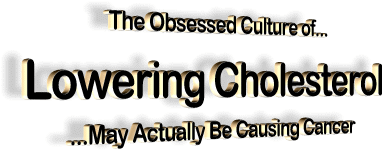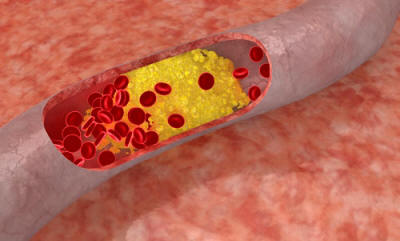|
|
|
April 10, 2012
We have become a culture so obsessed with eating foods low in cholesterol and fat that many health experts are now questioning the consequences.
Could we really maintain a dietary lifestyle that was so foreign to many of our ancestral populations without any ill effects on our health? Many researchers are now concluding that the answer to that question is "NO."
Current data is now suggesting that lower cholesterol levels predate the development of cancer.
In fact it is a fairly safe bet that
if you asked anyone on the street for his or her instinctive
response, if asked about cholesterol, they would probably say that
we simply need to 'reduce it'.
Naturally this comes at a price and requires those who can afford it to pay maybe four or five times what a 'typical ordinary' product might cost.
Steve Riechman, a researcher in the Department of Health and Kinesiology, says the study reveals that LDL is not the evil Darth Vader of health it has been made out to be in recent years and that new attitudes need to be adopted in regards to the substance.
New data from the Framingham Heart Study (FHS) offspring cohort help shed light on the question, mainly by eliminating the reverse-causality hypothesis that cancer is responsible for significantly lower serum concentrations of LDL cholesterol.
Presenting at the American College of Cardiology 2012 Scientific Sessions, Lavigne said the association between serum cholesterol levels and cancer incidence was first documented more than 30 years ago.
More recently, a 2007 meta-analysis by Drs Alawi Alsheikh-Ali and Richard Karas (Tufts University School of Medicine, Boston, MA) showed there was a "significant and linear relationship" between LDL levels achieved and risk of new cancer cases.
Another study published in 2008 by the same researchers showed a similar relationship between low LDL-cholesterol levels and incident cancer.
from OfficeOfMedicalAndScientificJustice Website
Unfortunately, despite dozens of studies, cholesterol has not been
shown to actually cause CVD. To the contrary, cholesterol is vital
to our survival, and trying to artificially lower it can have
detrimental effects, particularly as we age.
Alternately, a good number of us may have heard the terms 'good'
cholesterol and 'bad' cholesterol bandied about without knowing much
about what this really means. In fact it is a fairly safe bet that
if you asked anyone on the street for his or her instinctive
response, if asked about cholesterol, they would probably say that
we simply need to 'reduce it'.
Naturally this comes at
a price and requires those who can afford it to pay maybe four or
five times what a 'typical ordinary' product might cost. But is this
apparent 'blanket need' to strive towards lowering our cholesterol
justified? And, indeed, is it healthy?
Cholesterol is a naturally occurring lipid.
This means it is a type of fat or oil and it is in fact an essential component in creating and sustaining the membranes of the cells of all bodily tissues. So this alone means we need cholesterol to survive! Most of the cholesterol that is found in our bodies is actually naturally manufactured within our own cells.
However there is also an additional contribution that we get from external 'nutritional' sources - the foods we consume.
In a typical diet providing around
400mg of cholesterol per day from food sources, about half to
two-thirds of this amount is actually absorbed through the process
of digestion. The body will normally secrete about a gram (1000mg)
of cholesterol per day into the bile via the ducts, and
approximately three-fifths of this is then re-absorbed.
This is why, in order to be moved around, it must become 'associated' with certain lipoproteins which feature a water-soluble (therefore 'blood transportable') coat of proteins.
There are two key types of lipoproteins that transport cholesterol around the body: low-density and high-density variants. The essential cellular function of cholesterol requires that sufficient amounts are manufactured by specialized sub-systems (or organelles) within the body's cells called the endoplasmic reticulum. Alternatively, the cholesterol we need must be derived from our diet.
During the process of 'digestion and assimilation' of
foods, it is the low-density lipoprotein (LDL) that carries dietary
cholesterol from the liver to various parts of the body.
Cholesterol is simply a necessary
ingredient that is required to be regularly delivered around the
body for the efficient healthy development, maintenance and
functioning of our cells. The difference is in the 'transporters'
(the lipoproteins HDL and LDL) and both types are essential for the
human body's delivery logistics to work effectively.
As these deposits build up, they restrict the
arteries' width and flexibility. This causes an increase in blood
pressure and can also lead to other cardiovascular problems such as
heart attacks or strokes.
However, it seems that it has become common for
humans to have a preponderance of 'unhealthily' small LDL particles,
which can become a precursor to heart and arterial disease due to
the mechanisms described. It is apparently healthier to have a
smaller number of larger LDL particles carrying the same quantity of
cholesterol than a large number of small LDL particles might
transport, but for some reason this is less common. This is an
interesting area that demands more research.
This is when the
process can become health threatening. It has therefore been
suggested that increasing the amount of antioxidants in our diet
might effectively 'mop up' free radicals, and consequently reduce
this harmful oxidation. Although the idea of consuming foods rich in
antioxidants, or even using supplements, is now widely promoted, the
scientific evidence for their efficacy still remains to be fully
established.
This is why triglycerides are
usually measured when a cholesterol test of your blood is
undertaken.
This implies that anyone
whose LDL or triglyceride levels are unduly high should cut back on
those sweet sugary snacks, and even on the sweeter, fructose laden
fruits; not simply reduce their intake of fatty foods!
However, in keeping with the best traditions of consuming 'all things in moderation', currently recommended upper limits for daily intake of niacin is 35mg, given that it can have toxic effects in larger amounts.
Even so, medical professionals have been known to
prescribe niacin in doses as high as 2g, up to three times a day,
for treatment of those with dangerously high blood cholesterol
levels. Naturally you should never self-medicate with high doses of
niacin without taking appropriate medical advice.
Most likely you have a friend or relative taking these useless drugs (Lipitor, Mevecor, Crestor, etc.) to lower cholesterol. Statin medications are the number-one-selling drugs in the world. They work by interfering with the liver function and reducing the production of LDL.
But Statins are a questionable
innovation on at least a couple of accounts. Firstly they are not
without side-effects: they can, for example, lead to the breakdown
of major muscular material, which can ultimately overwhelm the
kidneys and even cause acute renal failure.
CoQ10 (as it is sometimes called) has also been shown to protect the brain against neurological degeneration. But perhaps most interestingly, with respect to cholesterol, CoQ10 also acts as an antioxidant, particularly active in protecting the system against LDL oxidation and the potential problems associated with this as described above.
So whilst Statins might provide a reduction in LDL
per se, they might also be causing more problems in the long-term.
Naturally, as with many modern drugs, they generally have to be
taken for the long-term by anyone who has been prescribed them.
But they may also be prescribed without the over-arching message that in order to address any cholesterol problem 'naturally', the sufferer must change their lifestyle and diet.
Statins can seem an easy option but may indeed merely be the beginning of a process where the 'negative health pay-off' is simply delayed rather than actively defused!
That is not to say that in
extreme cases of high blood cholesterol, or hypercholesterolemia,
there may not be a useful role for Statin therapy when natural
strategies fail or do not prove effective, or feasible.
It is most likely that any imbalance in our cholesterol transport system comes down to long-term poor dietary and exercise habits. Ensuring that we consume some extra anti-oxidant foods, along with including niacin rich foods, might well be of benefit.
But it is perhaps most important to recognize that deliberate and continued levels of activity and the consumption of a healthful diet is a better solution than questionable quick-fix drugs, if we ever are diagnosed with levels of cholesterol and triglycerides that might give cause for concern.
Dr. Ron Rosedale On The Facts About Cholesterol
May 4, 2011 from TexasA&MUniversity Website
The so-called "bad cholesterol" -
low-density lipoprotein commonly called LDL - may not be so bad
after all, shows a Texas A&M University study that casts new light
on the cholesterol debate, particularly among adults who exercise.
His work, with help from colleagues from,
...is published in the Journal of Gerontology.
The study showed that after fairly vigorous workouts, participants who had gained the most muscle mass also had the highest levels of LDL (bad) cholesterol,
It's perhaps one of the biggest health myths propagated in western culture and certainly in the United States.
Unfortunately, despite dozens of
studies, cholesterol has not been shown to actually cause
cardiovascular disease as doctors tell us. To the contrary,
cholesterol is vital to our survival, and trying to artificially
lower it can have detrimental effects, particularly as we age.
But is this apparent 'blanket need' to strive towards lowering our cholesterol justified? And, indeed, is it healthy? For anyone who has had the official diagnosis of 'high cholesterol' in their bloodstream, they may even have embarked upon a program of medicinal intervention.
In fact it is quite likely that they may
have joined the legions of long-term pill-poppers who are already
lining the pockets of
the profit-oriented pharmaceutical giants.
cholesterol plaque in an artery
Cholesterol is found in all humans and is a type of fat around the body.
A person’s total cholesterol level
is comprised of LDL (low-density lipoprotein) and HDL (high-density
lipoprotein) cholesterol.
According to the American Heart Association, about 36 million American adults have high cholesterol levels.
Riechman says the study could be helpful in looking at a condition called sarcopenia, which is muscle loss due to aging.
Previous studies show muscle is usually lost at a rate of 5 percent per decade after the age of 40, a huge concern since muscle mass is the major determinant of physical strength.
After the age of 60, the prevalence of moderate to severe sarcopenia is found in about 65 percent of all men and about 30 percent of all women, and it accounts for more than $18 billion of health care costs in the United States.
|


